牛津译林版9A Unit2 colour Grammar 课件
文档属性
| 名称 | 牛津译林版9A Unit2 colour Grammar 课件 | 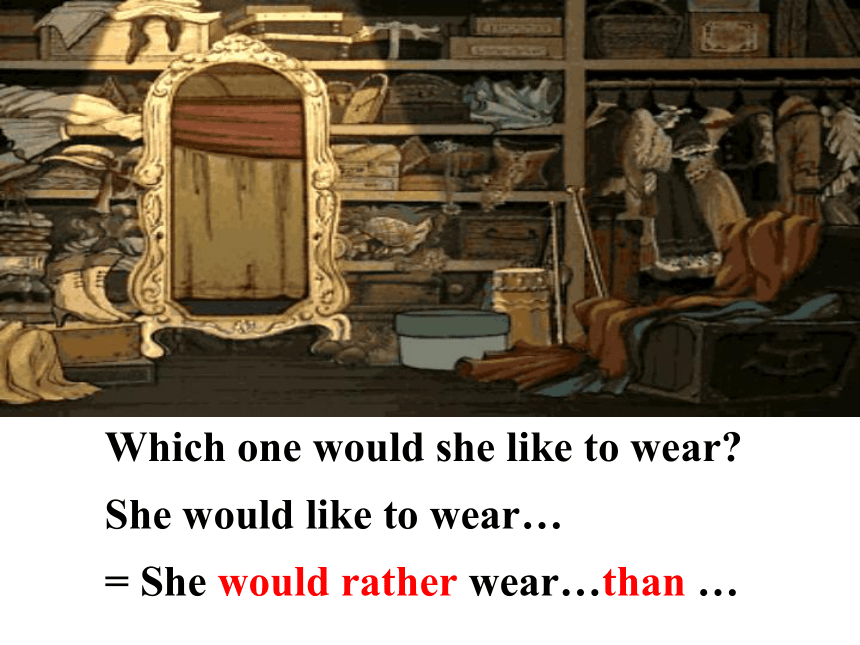 | |
| 格式 | zip | ||
| 文件大小 | 3.2MB | ||
| 资源类型 | 教案 | ||
| 版本资源 | 牛津译林版 | ||
| 科目 | 英语 | ||
| 更新时间 | 2012-09-07 14:55:49 | ||
图片预览


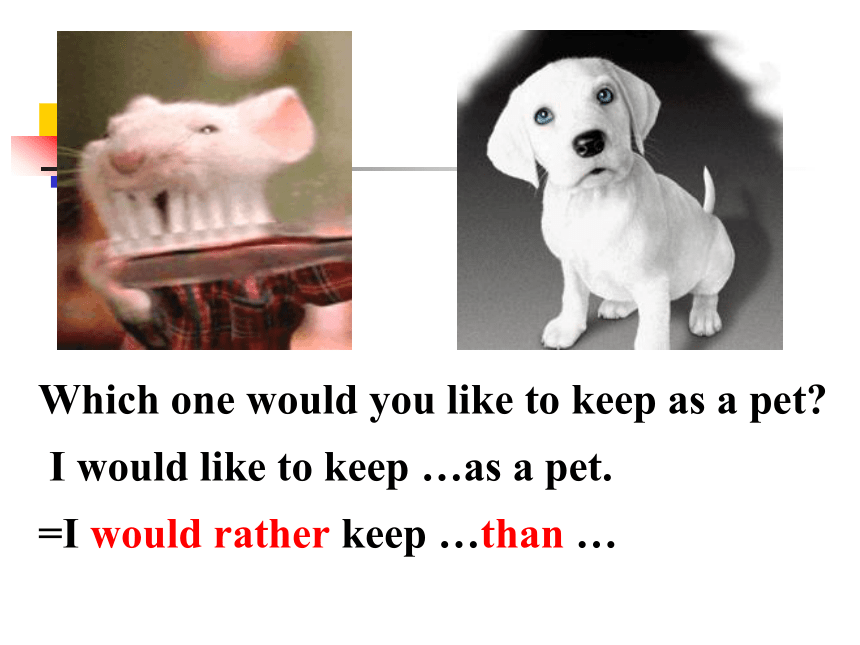
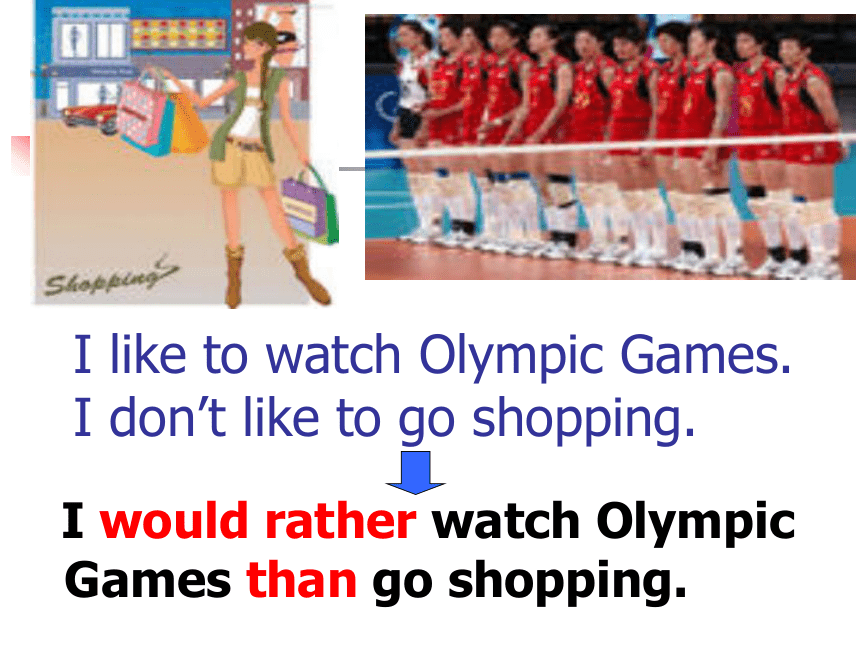
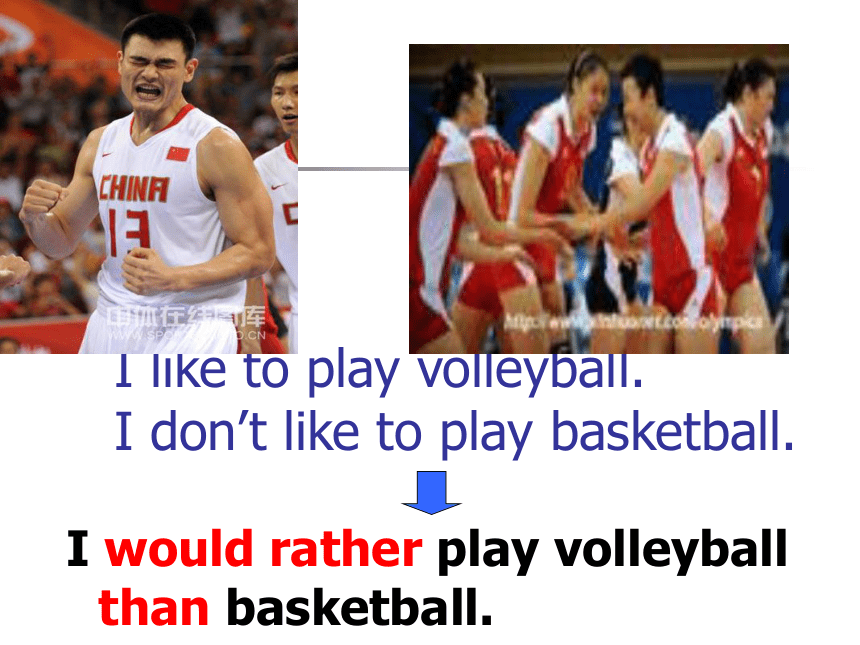
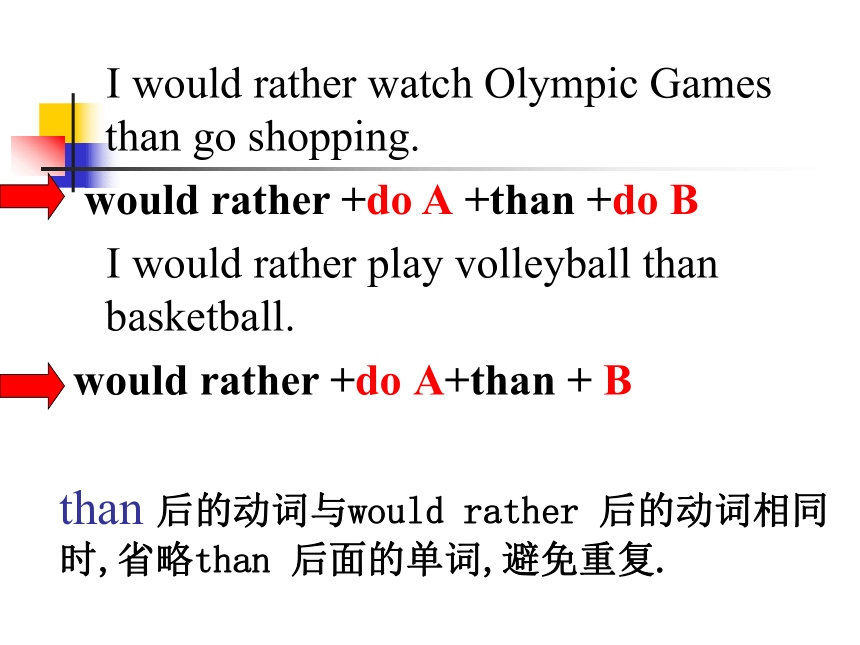

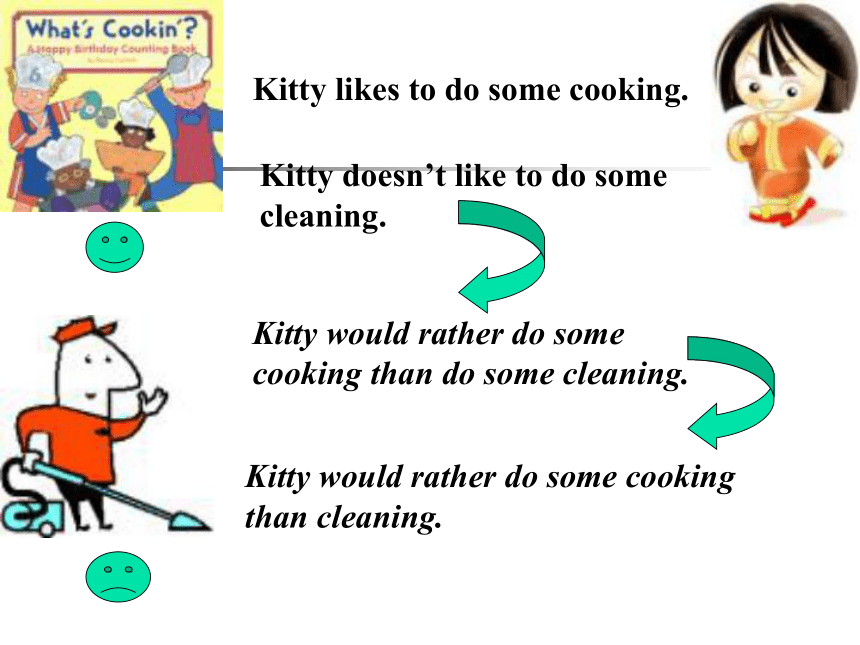
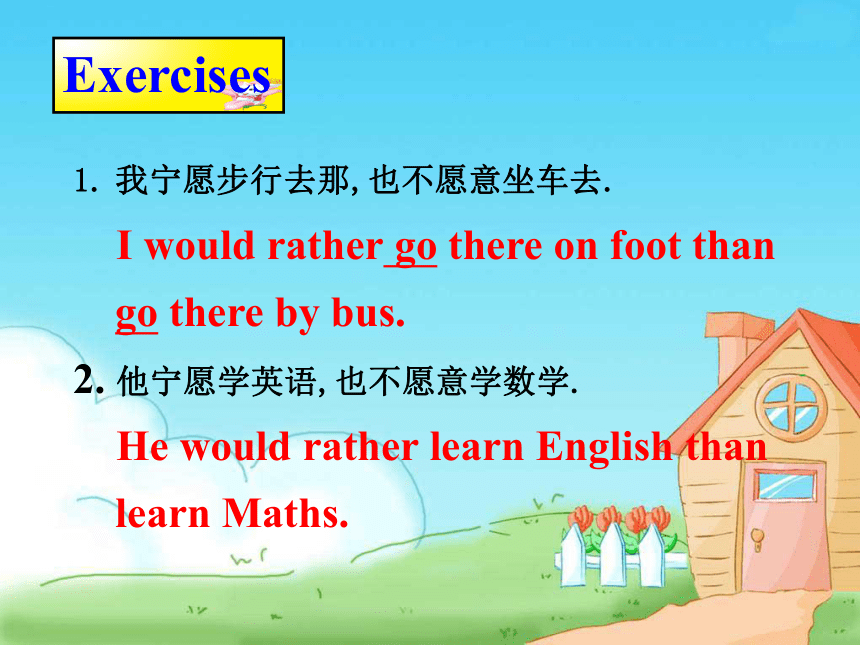
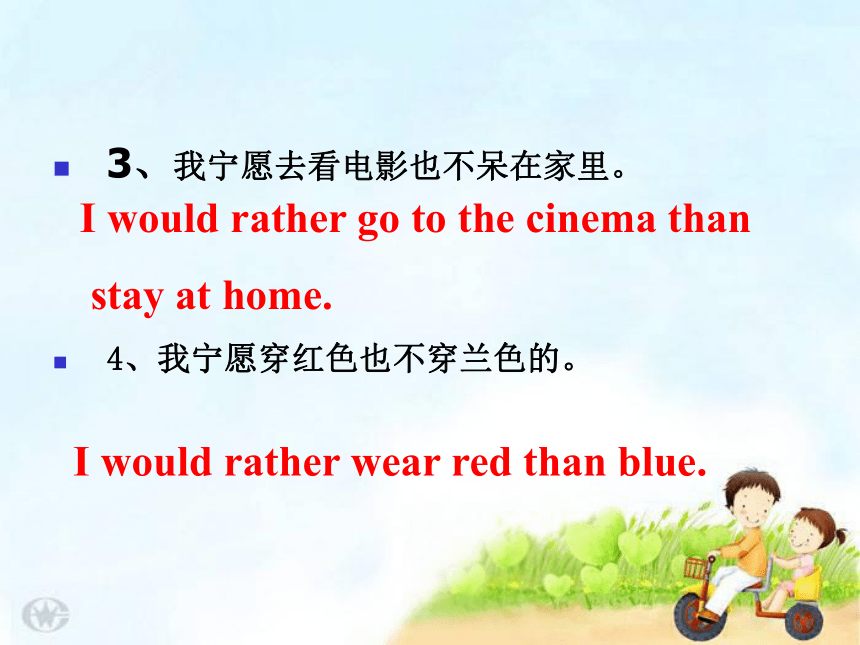
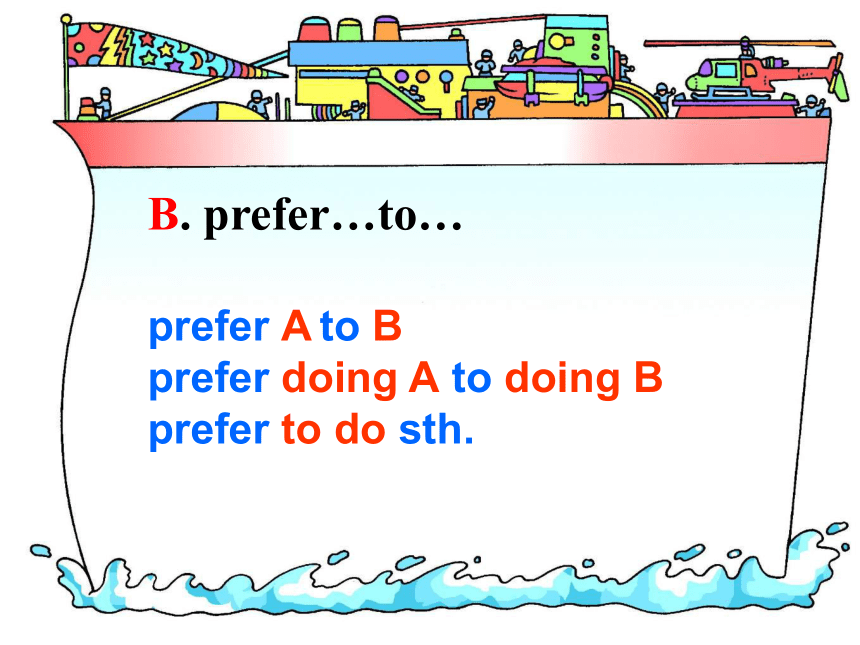

文档简介
(共36张PPT)
Which one would she like to wear
She would like to wear…
= She would rather wear…than …
Unit 2 Grammar
Which one would you like to keep as a pet
I would like to keep …as a pet.
=I would rather keep …than …
I like to watch Olympic Games.
I don’t like to go shopping.
I would rather watch Olympic Games than go shopping.
I like to play volleyball.
I don’t like to play basketball.
I would rather play volleyball than basketball.
than 后的动词与would rather 后的动词相同时,省略than 后面的单词,避免重复.
I would rather watch Olympic Games than go shopping.
would rather +do A +than +do B
I would rather play volleyball than basketball.
would rather +do A+than + B
I like doing some shopping.
I don’t like doing some washing.
I would rather do some shopping than do some washing.
I’d rather do some shopping than washing.
Kitty likes to do some cooking.
Kitty doesn’t like to do some cleaning.
Kitty would rather do some cooking than do some cleaning.
Kitty would rather do some cooking than cleaning.
Exercises
我宁愿步行去那,也不愿意坐车去.
I would rather go there on foot than go there by bus.
2. 他宁愿学英语,也不愿意学数学.
He would rather learn English than learn Maths.
3、我宁愿去看电影也不呆在家里。
4、我宁愿穿红色也不穿兰色的。
I would rather go to the cinema than
stay at home.
I would rather wear red than blue.
prefer A to B
prefer doing A to doing B
prefer to do sth.
B. prefer…to…
Mary prefers a kind teacher to a strict one.
a kind teacher
a strict teacher
Which one does she like better
She likes black dress better.
= She prefers the black dress to the red dress.
Which one does she like better
She likes the white clothes better.
= She prefers the white clothes to
the colourful clothes.
Which one does she like better
She likes the sports bag better.
= She prefers the sports bag to the
school bag.
He prefers …to …
What would Eddie like to do
prefer… to… 宁愿,更喜欢 后跟名词或动名词
e.g. 和冬季相比,我更喜欢夏季.
I prefer summer to winter.
e.g. 我宁愿呆在家里也不愿购物.
I prefer staying at home to going shopping.
prefer doing A to doing B.
= would rather do A…than do B…
1. 他喜欢红色而不喜欢黄色.
He prefers red to yellow.
2. 星期天我喜欢出去,不喜欢呆在家里.
I prefer going out to staying at home on Sundays. =
I would rather go out than stay at home on Sundays.
Practice
3. Jim喜欢打篮球而不喜欢踢足球.
Jim prefers playing basketball to playing football.
= Jim would rather play basketball than football.
Practice
Exercises
1. I _____ (would/could) rather go swimming than __ (to go/go) shopping.
2. I’d rather ___ (eat/to eat) Chinese food ____ (to/than) Japanese food.
3. Many men prefer blue __ (than/to) red.
would
go
eat
than
to
4. I prefer _______ (listening/to listen) to music to playing computer games.
5. Bob prefers _______ (to send/ sending) e-mails to ______ (write/ writing) letters.
listening
sending
writing
不定代词:不确定、不需要提及名字的某样
东西或者人。
something
anything
nothing
everything
none
C:Indefinite pronouns
someone/ somebody
anyone/ anybody no one/ nobody
everyone/everybody
none
人 物
C. someone/somebody, anyone/ anybody and no one/nobody
There is someone in next room.
(改为否定句)
Three isn’t anyone in next room.
=There is no one in the classroom.
Where should we use “someone”,
“anyone” or “no one ”
1. We use someone/somebody in positive sentences to refer to ________.
2. We use anyone/anybody in negative sentence to refer to people. It’s the negative form of someone/somebody.
Summary
people
3. When we use anyone/anybody in positive sentences, it means “any person”.
e.g. Anyone can took part in this competition.
D. something, anything, nothing and none
1. Millie has something in her hands. (否定)
Millie doesn’t have anything in her hands.
= Millie has nothing in her hands.
2. How many eggs are there in the fridge None.
1. Something, anything, nothing and none are used to refer _______.
2. Something is used in positive sentence while anything is used in negative sentence.
Summary
things
3. When we are offering something or when we expect the answer to be “yes” we can use “something” in questions.
e.g. Would you like something to eat
(You want the person say “yes”.)
Exercises
---What a big box! Can I help you --- No, thanks. There’s _______ in it.
It’s empty.
nothing
3. --- There’s _________ wrong with my clock. It doesn’t work. --- Don’t worry. Let me have a look.
4. --- ________ is in the classroom.
Where are they --- They are all on the playground.
5. --- How easy the maths exam was! --- Yes. But I don’t think ________
could pass it.
something
No one
everyone
6. --- Listen! ________ is knocking at the door.
7. ---What do you think of Kitty --- She is my true friend. She never
tells my secrets to _______.
8. --- Helen, what did you talk with Bob --- He asked me to tell him _________
I knew.
Someone
anyone
something
不定代词的定语要后置
1.Is there anything interesting in today’s newspaper
2.I don’t think there’s something wrong with the computer.
3.Do you have anything to say for yourself
4.Anybody who got it should put up his hand.
Tag questions:
在反意疑问句中,如果不定代词是以-one 或-body结尾的,则附加句的主语用he或they;如果不定代词是以-thing结尾的,则附加句主语用it.
e.g. 每个人都知道答案,不是吗?
Everybody knows the answer, don’t they/doesn’t he
世上无难事,是吗?
Nothing is difficult in the world, is it
Tag questions:
1.There is someone in the fitting room, ______________
2.There isn’t anything unusual this morning, ___________
3.Nobody was in, ____________
4.Nothing can be seen, ________
isn’t there
is there
was he/they
can it
Which one would she like to wear
She would like to wear…
= She would rather wear…than …
Unit 2 Grammar
Which one would you like to keep as a pet
I would like to keep …as a pet.
=I would rather keep …than …
I like to watch Olympic Games.
I don’t like to go shopping.
I would rather watch Olympic Games than go shopping.
I like to play volleyball.
I don’t like to play basketball.
I would rather play volleyball than basketball.
than 后的动词与would rather 后的动词相同时,省略than 后面的单词,避免重复.
I would rather watch Olympic Games than go shopping.
would rather +do A +than +do B
I would rather play volleyball than basketball.
would rather +do A+than + B
I like doing some shopping.
I don’t like doing some washing.
I would rather do some shopping than do some washing.
I’d rather do some shopping than washing.
Kitty likes to do some cooking.
Kitty doesn’t like to do some cleaning.
Kitty would rather do some cooking than do some cleaning.
Kitty would rather do some cooking than cleaning.
Exercises
我宁愿步行去那,也不愿意坐车去.
I would rather go there on foot than go there by bus.
2. 他宁愿学英语,也不愿意学数学.
He would rather learn English than learn Maths.
3、我宁愿去看电影也不呆在家里。
4、我宁愿穿红色也不穿兰色的。
I would rather go to the cinema than
stay at home.
I would rather wear red than blue.
prefer A to B
prefer doing A to doing B
prefer to do sth.
B. prefer…to…
Mary prefers a kind teacher to a strict one.
a kind teacher
a strict teacher
Which one does she like better
She likes black dress better.
= She prefers the black dress to the red dress.
Which one does she like better
She likes the white clothes better.
= She prefers the white clothes to
the colourful clothes.
Which one does she like better
She likes the sports bag better.
= She prefers the sports bag to the
school bag.
He prefers …to …
What would Eddie like to do
prefer… to… 宁愿,更喜欢 后跟名词或动名词
e.g. 和冬季相比,我更喜欢夏季.
I prefer summer to winter.
e.g. 我宁愿呆在家里也不愿购物.
I prefer staying at home to going shopping.
prefer doing A to doing B.
= would rather do A…than do B…
1. 他喜欢红色而不喜欢黄色.
He prefers red to yellow.
2. 星期天我喜欢出去,不喜欢呆在家里.
I prefer going out to staying at home on Sundays. =
I would rather go out than stay at home on Sundays.
Practice
3. Jim喜欢打篮球而不喜欢踢足球.
Jim prefers playing basketball to playing football.
= Jim would rather play basketball than football.
Practice
Exercises
1. I _____ (would/could) rather go swimming than __ (to go/go) shopping.
2. I’d rather ___ (eat/to eat) Chinese food ____ (to/than) Japanese food.
3. Many men prefer blue __ (than/to) red.
would
go
eat
than
to
4. I prefer _______ (listening/to listen) to music to playing computer games.
5. Bob prefers _______ (to send/ sending) e-mails to ______ (write/ writing) letters.
listening
sending
writing
不定代词:不确定、不需要提及名字的某样
东西或者人。
something
anything
nothing
everything
none
C:Indefinite pronouns
someone/ somebody
anyone/ anybody no one/ nobody
everyone/everybody
none
人 物
C. someone/somebody, anyone/ anybody and no one/nobody
There is someone in next room.
(改为否定句)
Three isn’t anyone in next room.
=There is no one in the classroom.
Where should we use “someone”,
“anyone” or “no one ”
1. We use someone/somebody in positive sentences to refer to ________.
2. We use anyone/anybody in negative sentence to refer to people. It’s the negative form of someone/somebody.
Summary
people
3. When we use anyone/anybody in positive sentences, it means “any person”.
e.g. Anyone can took part in this competition.
D. something, anything, nothing and none
1. Millie has something in her hands. (否定)
Millie doesn’t have anything in her hands.
= Millie has nothing in her hands.
2. How many eggs are there in the fridge None.
1. Something, anything, nothing and none are used to refer _______.
2. Something is used in positive sentence while anything is used in negative sentence.
Summary
things
3. When we are offering something or when we expect the answer to be “yes” we can use “something” in questions.
e.g. Would you like something to eat
(You want the person say “yes”.)
Exercises
---What a big box! Can I help you --- No, thanks. There’s _______ in it.
It’s empty.
nothing
3. --- There’s _________ wrong with my clock. It doesn’t work. --- Don’t worry. Let me have a look.
4. --- ________ is in the classroom.
Where are they --- They are all on the playground.
5. --- How easy the maths exam was! --- Yes. But I don’t think ________
could pass it.
something
No one
everyone
6. --- Listen! ________ is knocking at the door.
7. ---What do you think of Kitty --- She is my true friend. She never
tells my secrets to _______.
8. --- Helen, what did you talk with Bob --- He asked me to tell him _________
I knew.
Someone
anyone
something
不定代词的定语要后置
1.Is there anything interesting in today’s newspaper
2.I don’t think there’s something wrong with the computer.
3.Do you have anything to say for yourself
4.Anybody who got it should put up his hand.
Tag questions:
在反意疑问句中,如果不定代词是以-one 或-body结尾的,则附加句的主语用he或they;如果不定代词是以-thing结尾的,则附加句主语用it.
e.g. 每个人都知道答案,不是吗?
Everybody knows the answer, don’t they/doesn’t he
世上无难事,是吗?
Nothing is difficult in the world, is it
Tag questions:
1.There is someone in the fitting room, ______________
2.There isn’t anything unusual this morning, ___________
3.Nobody was in, ____________
4.Nothing can be seen, ________
isn’t there
is there
was he/they
can it
